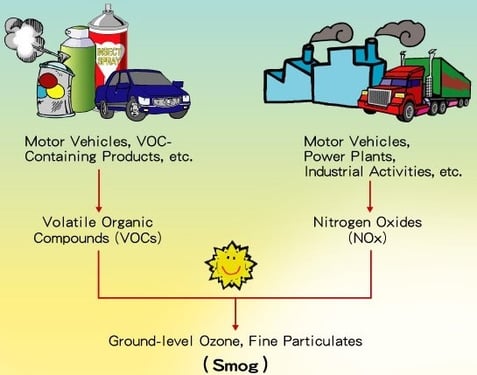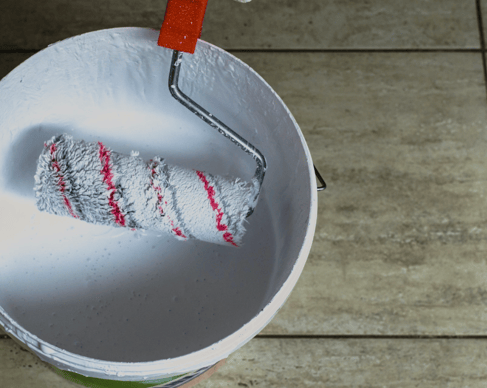There are products in your home emitting toxic VOCs into the air right now as you're reading this....
What Are VOCs?
You may have seen the term labeled on the can of fresh paint you just grabbed from the hardware store or even one of your trusty household cleaners. But do you know what VOCs are? Keep reading to learn more about what VOCs are, the dangers of them, and how you can avoid them.

VOC stands for Volatile Organic Compounds. Many VOCs are relatively harmless, and are produced naturally. Vegetation is a major source of isoprene, a VOC that is released naturally during the life and eventual decay of tree species like eucalyptus and oak. Many plants use VOCs to communicate with other plants in their ecosystems and even use them to send SOS messages when a threat is present. However, not all VOCs are created equal. Many VOCs can cause great harm to not only our environment, but also to our health. Some, such as formaldehyde and benzene, are even known carcinogens (chemicals known to cause cancer in humans).
How do VOCs work?
VOCs are emitted into the air as a gas from different liquids or solids during curing or aging. This is called off-gassing, and this process does not necessarily stop when the products you have used in your house have dried / do not smell any more. Many products contain harmful VOCs that will off-gas into your home for years, invisible and undetected, contaminating your indoor air quality. Dangerous VOCs are commonly found in a variety of different products that you likely already have in your household.
Common Household Products That Contain Harmful VOCs:
- Paint and paint thinner
- Wood stain and finishes
- Aerosol sprays
- Household cleaners
- Room deodorizers
- New cabinets, furniture, rugs
- New wood floors
- Candles
- Nail polish / nail polish remover
- Pesticides
- Gasoline & other petroleum products
- Personal care products
Health Effects of VOCs:
With all the products available on the market that contain VOCs, it can be challenging to avoid them. However, it is important to be aware of the adverse effects of VOCs and the potential long term health effects they can cause.
VOCs can cause:
- Eye, nose, throat irritation
- Headaches
- Dizziness
- Nausea and vomiting
- Nosebleeds
- Liver, kidney, and nervous system damage
How VOCs Affect Our Environment:

Volatile Organic Compounds play a big role in creating the ground-level ozone. The ground-level ozone layer itself can cause harm to our health. VOCs also “play a significant role in the formation of ozone and fine particulates in the atmosphere. Under sunlight, VOCs react with nitrogen oxides emitted mainly from vehicles, power plants and industrial activities to form ozone, which in turn helps the formation of fine particulates” (source).
How Vermont Natural Coatings is Helping to Combat Dangerous VOCs:
We recognize that harmful VOCs are a big problem that our planet is facing. All of our products are heavily monitored for safety and are considered either VOC free or Ultra-Low VOC. The VOC level for Vermont Natural Coatings finishes range from ≤180g/L (grams per liter) in our Floor Finish to zero VOC in our Penetrating Water Proofer Infused with Juniper.
The toughest indoor air quality standard for wood finish in the United States is California’s 275g/L, we far surpass this standard with our Ultra-Low VOC products.
For more information about VOCs and to find more products that are safer for you and your family, visit our partners at Rise, a building supply store focused on educating consumers and providing resources for a healthier and more environmentally friendly home.
Sources:
Environmental Protection Agency. (n.d.). EPA. Retrieved August 3, 2022, from https://www.epa.gov/indoor-air-quality-iaq/what-are-volatile-organic-compounds-vocs
Volatile Organic Compounds (vocs). Minnesota Pollution Control Agency. (2021, May 19). Retrieved August 3, 2022, from https://www.pca.state.mn.us/air/volatile-organic-compounds-vocs
(1)Volatile organic compounds and smog. Environmental Protection Department. (n.d.). Retrieved August 3, 2022, from https://www.epd.gov.hk/epd/english/environmentinhk/air/prob_solutions/vocs_smog.html




